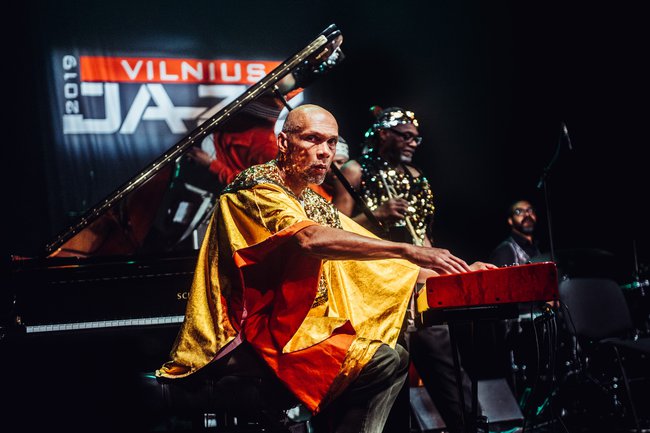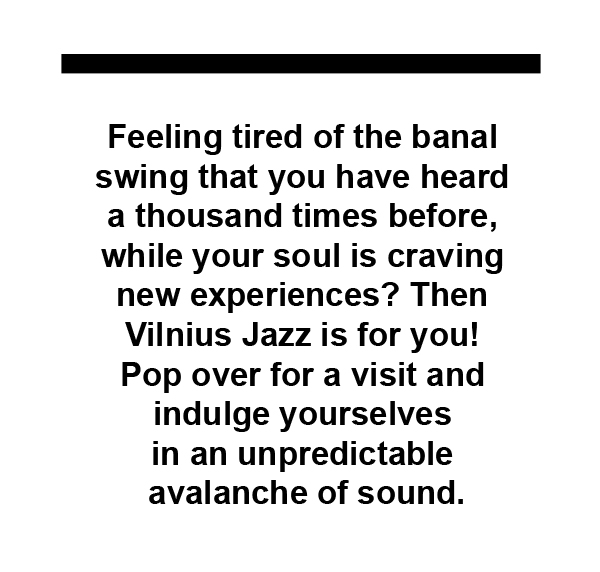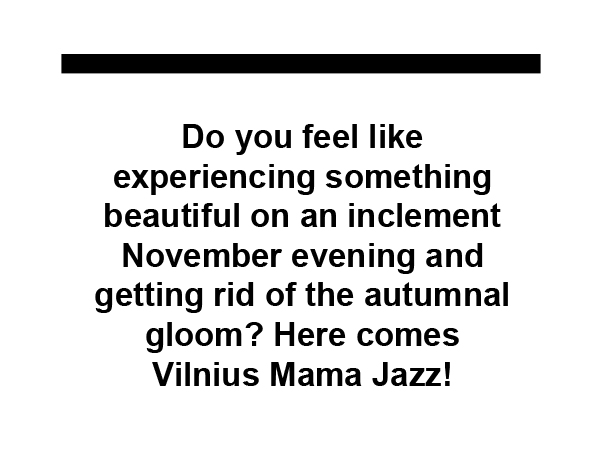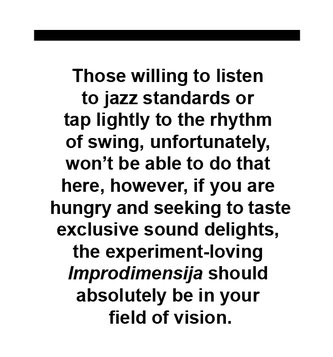Vitalijus GAILIUS | Vilnius Jazz Guide
Vilnius has had quite a few impressive labels attached to it. This city is spoken about as a capital of European baroque or as Jerusalem of the North, or dreamt about as Athens of the North. But in this article, I would like to talk about Vilnius as the city of jazz. After all, it was here where in the 1970s the paths of Vyacheslav Ganelin, Vladimir Tarasov and Vladimir Chekasin crossed. Those three went on to amaze not only the world behind the Iron Curtain but also the West with their uniqueness. Until present day, discussions continue about the existence of Vilnius jazz school, the foundations for which were laid by that trio.
Even during the politically difficult years in the Soviet Lithuania jazz was played in the capital. On 13 March 1963, the Vilnius jazz club was founded in a youth cafe/reading room (current Vilniaus street). It was the first club dedicated to this music genre, which lived for merely a few years. Held there were not only gigs by musicians who were forming the Lithuanian jazz scene of that time but also lectures on music.
Once the jazz club operating in the youth cafe/reading room closed down, the lovers of this style began gathering at what was then the Institute of Fine Art. However, it was just a small-scale initiative involving a limited circle of people. After all, the Soviet government’s unfavourable view of jazz obliged to behave cautiously. Unfortunately, just like its precursor, this more conspiratorial club functioned only for a brief period.The long-time traditions were continued by the legendary Neringa restaurant located in the very heart of Gedimino avenue, the facade of which is currently covered by scaffolding, while resounding inside, instead of jazz, are the sounds of construction tools. Although the history of that place is closely related to the activity of the Soviet government’s security structures, it was here that jazz evenings began taking place in 1969. Playing here were not only Ganelinas, Tarasovas and Čekasinas’ trio but also Leonidas Šinkarenka, Vytautas Labutis, Petras Vyšniauskas, Gediminas Laurinavičius and others.
After the country regained independence, jazz continued being played. In Autumn 1992, in a house number 8 on Ašmenos street, in an abandoned hall of the House of Athletes Petras Ubartas-Sniegius held an unusual party of young music bands the result of which was the first live music club in independent Lithuania under the name Langas (Window). There, alongside other music styles, jazz was often played. The club discontinued its operation some time before the dawn of the 21st century.
The first decade of the new century witnessed the stagnation that came to prevail. In 2005, the club Tamsta was opened where from time to time sounds of jazz were heard. By the way, the club still exists and sometimes includes jazz bands or performers in its repertoire. However, the space dedicated purely to jazz appeared only in 2011 thanks to the efforts of the saxophone player Petras Vyšniauskas. The club Jazz Kablys (Jazz Hook, Kauno st. 3A), in spite of its brief existence, was a very heartening initiative. But what is the situation in Vilnius today? Where in this city can one listen to some freedom-exuding jazz? Let us set off on a walk down the capital’s jazz paths.Jazz festivals
The most durable and decades-long part of Vilnius jazz culture is festivals. Vilnius Jazz is perhaps the most deeply rooted of them in the capital. This festival, which started at the initiative of the jazz enthusiast Antanas Gustys and his friends in 1988, is continuing until today. The annual event held in mid-October now became an integral part of the city life attracting music gourmets not only from Lithuania but also from abroad. The fact that Vilnius Jazz is not a little elite festival on the periphery is evidenced by the reviews of the festival that appear on pages of such publications as Jazzwise Magazine or the All About Jazz platform.
Differently than other festivals of jazz music in Lithuania, Vilnius Jazz stands out with its consistency and a strong orientation towards the avant-garde, free jazz and improvisational music. Every year, this festival becomes a host to the most unexpected sounds and consonances, among which the listener will undoubtedly experience something unique.Over its history spanning more than three decades, many world-renowned musicians have demonstrated their mastery on the festival scene. They include not only the older formation of free jazz stars but also the younger generation of experimenters. Thanks to the Vilnius Jazz festival, Vilnius audiences have had the opportunity to enjoy not only the classics of the genre, such as Alexander von Schlippenbach, Han Bennink, György Szabados or Peter Brötzmann, but also the music by the most prominent contemporary performers like Mats Gustafsson, Alexander Hawkins, Nate Wooley or Cuong Vu.
The organisers of the festival do not hide their desire to include the younger generation in the country’s general vortex of jazz. To this end, the Vilnius Jazz Young Power competition for young Lithuanian jazz musicians and bands is being held alongside the main Vilnius Jazz programme. It is a great opportunity for young performers to go public and showcase their work to wider audiences. Sheep Got Waxed, one of the most promising bands of the new generation which often performs abroad, as well as the pianist Dmitry Golovanov and others have won this competition.
Feeling tired of the banal swing that you have heard a thousand times before, while your soul is craving new experiences? Then Vilnius Jazz is for you! Pop over for a visit and indulge yourselves in an unpredictable avalanche of sound.For those looking for lighter sounds and melodies, the Lithuanian capital offers an alternative – Vilnius Mama Jazz. Of course, this festival also sometimes incorporates free and avant-garde jazz into its repertoire, but much more pronounced here is the tendency towards jazz-rock, fusion or nu- jazz. This year, the festival, initiated by Judita Bartoševičienė in 2002, took place for the 19th time. Like Vilnius Jazz, Vilnius Mama Jazz takes place in autumn, only a month later, in November. So, autumn in Vilnius means not only puddles and falling yellow leaves but also jazz echoes.
Over the nearly two decades, the Vilnius Mama Jazz stage hosted a constellation of musicians representing various schools and generations: from guitar legends John Scofield, John McLaughlin or the pianist Chick Corea to such personalities of the young generation as Geral Clayton, Ambrose Akinmusire, Marius Neset or Mathias Eick.
Vilnius Mama Jazz does not limit itself to just principal evening concerts. The festival organisers also invite audiences to their showcase format events that present on stage various collectives and performers from Lithuania and beyond. Also, various talks are held within the frame of Vilnius Mama Jazz during which participating musicians and guest representatives of music industry discuss the prevailing tendencies in the music world and gladly answer the questions of the festival visitors.
Do you feel like experiencing something beautiful on an inclement November evening and getting rid of the autumnal gloom? Here comes Vilnius Mama Jazz!Sometimes it happens in Vilnius that even the most incredible ideas get realised. In 2017, the New York-based percussion master Dalius Naujokaitis and his friends initiated Peronas Jazz festival which took place in the space of Peronas bar located in immediate proximity to the railway station tracks. The festival offered the most varied sonic experiments that often transcended the jazz definition lines, however, sadly, after just two editions, this initiative that relied on DIY principles slumped into lethargy. But who knows, maybe this festival or other new jazzy initiatives will shake Vilnius up again. Stay tuned!
Jazz Cellar 11
At the end of 2015, the jazz gourmets of Lithuania heard the news about the opening of a club specifically dedicated to this genre in the capital. The tiny yet cosy basement located near the icon of the Gate of Dawn Madonna (Aušros vartų st. 11) in Vilnius became home to jazz.
The club’s repertoire is particularly varied. By opening the doors leading to Jazz Cellar 11, one can hear not only the lexicon of swing or bebop era but also unpredictable whirls of free jazz. On your trip to the club, don’t be surprised to see the expressive guitarist Juozas Milašius, the legendary composer Vyacheslav Ganelin, the ingenious percussion masters Arkady Gotesman or Vladimir Tarasov, alongside such wind virtuosi as Petras Vyšniauskas or Liudas Mockūnas. Unquestionably, besides the old-timers of the Lithuanian jazz scene, the club is also open to the creative and promising representatives of the young generation. Here one can listen to the pianists Domas Žeromskas, Giedrius Nakas, Mantvydas Leonas Pranulis, the drummer Augustinas Baronas, the guitarists Mindaugas Stumbras and Deimantas Balys Jurevičius and many other future stars.
This jazz hub located in the vicinity of the Gate of Dawn is regularly visited by esteemed foreign musicians. The stage of Jazz Cellar 11 has hosted one of the most prominent Latvian saxophone players Deniss Pashkevich on a number of occasions, as well as the rising French star pianist Gauthier Toux, the formidable force of Germany’s jazz Steffen Schorn, the USA saxophonist Walt Weiskopf, the big name in Sweden’s free jazz drummer Raymond Strid, the Danish trumpet player Kasper Tranberg, and the guitar virtuosi Enver İzmaylov and Marc Ducret.It would be hard to imagine a jazz club that doesn’t hold jam sessions. That is an important and old tradition of this musical genre, and Jazz Cellar 11 cherishes traditions. Those visiting the club will have an opportunity to enjoy the dialogue between the musicians in the process of being created here and now. Moreover, this club distinguishes oneself with evenings dedicated to jazz classics (Miles Davis, Chet Baker, Charlie Parker and others), which invite audiences to hear the works and interpretations of world-renowned creators, and often, as the evening progresses, to dive into the whirlwind of a jam session. Who knows, maybe in the future this basement club will be compared to the legendary Krakow cabaret Piwnica Pod Baranami that is still going strong.
Cycle of concerts Improdimensija
Improdimensija (Improdimension) is a cycle of events dedicated to free jazz and improvisational music. Its roots go back to 2011 when the pianist, percussionist and composer Arnas Mikalkėnas and the current director of the Lithuanian Jazz Federation Julijus Grickevičius started organising concerts in Kaunas. In 2017, when this initiative was joined by one of the most prominent saxophonists of his generation Liudas Mockūnas alongside the soul of Mama Studios and sound director Arūnas Zujus, the gigs started to be held in Vilnius.Those willing to listen to jazz standards or tap lightly to the rhythm of swing, unfortunately, won’t be able to do that here, however, if you are hungry and seeking to taste exclusive sound delights, the experiment-loving Improdimensija should absolutely be in your field of vision.
Collaborating within the walls of Mama Studios are not only the old-timers of the stage (Dalius Naujokaitis, Eugenijus Kanevičius, Vyacheslav Ganelin and others) but also musicians of the young generation (Kazimieras Jušinskas, Mėta Pelegrimaitė, Dovydas Stalmokas and others), who, together with their older colleagues, create memorable performances.
As Improdimensija project is gathering its speed, Vilnius is increasingly frequently visited by international improvisational music stars. The concerts of this cycle already presented percussionists Christian Windfeld, Håkon Berre and Kresten Osgood, the Spanish pianist and composer Augusti Fernandez, the Polish trumpet player Tomasz Dąbrowski, the bass virtuoso from Norway Per Zanussi, while in May 2019, one of the brightest jazz and improvisational music stars the saxophonist Mats Gustafsson held a three-day residency at Improdimensija.
The strong side of Improdimensija is not just the professional concerts by musicians but also the space itself. First of all, the concerts take place in the Vilnius quarter that stands out with its unique urbanscape – Žvėrynas. Moreover, Mama Studios stands next to one of the earliest masterpieces of post-war modernist architecture that is also known as Composers’ House (A. Mickevičiaus st. 29). In the small and cosy environment of Mama Studios which nonetheless boasts great acoustics, the distance between the musician and the audience decreases to the minimum opening up the opportunity for a unique sonic experience. This studio allows the listener to hear everything, down to the most delicate push of a saxophone key or the percussionist’s gentle brush on the plate. Sometimes one feels cautious not to cough, seeking to avoid disturbing the sacral musical aura. By the way, one more special feature of the Improdimensija cycle is that the gigs are happening in sessions, i.e. Spring and Autumn/Winter.Two bars in Vilnius: Vėjai and Nauji Vėjai
Following the half-century-long silence, the youth cafe where jazz lovers used to gather mentioned in the introduction became filled with sounds of jazz once again. Several years ago, the space reopened its doors as the bar Vėjai (Winds, Vilniaus st. 22), the name of which, it seems, was inspired by the Keturi Vėjai (Four Winds) magazine published in the interwar period by Lithuanian avant-garde poets.
Located on one of the busiest streets of the capital (in terms of bar-goers rather than the transport), this bar has become a real point of attraction. People pop in not only for a pint with friends but also for some jazz! The absolute majority of bands and performers playing in Vėjai are local representatives of the young generation who do not lack the imagination to be able to surprise their audiences with unexpected musical solutions every time. Raising the roof in Vėjai are members and friends of such bands as the experimenters Sheep Got Waxed, the irrepressible Džiazlaif or the leaning-towards-fusion Castor Stetson. Sometimes, Dalius Naujokaitis or Juozas Milašius bring an onset of a storm to Vėjai. Of course, there are also guests from abroad.
With Vėjai growing increasingly stronger, new winds in the form of Nauji Vėjai (New Winds) started blowing in the distinct building at number 27 on Gedimino avenue. It is a more spacious brother of the Vilnius street’s Vėjai and the majority of concerts is now being held there. Both spaces are similar in their unconstrained and free spirit. Exactly the kind that lives at the heart of its majesty jazz. Besides, just like with the building on Vilniaus st. 22, a historic undercurrent also runs through Gedimino av. 27. Firstly, it is one of the most precious examples of interwar modernist architecture in Vilnius. Secondly, it was here where in 2010, inspired by the Fluxus founder Jurgis Mačiūnas’ manifesto, active townspeople and their friends established Fluxus Ministerija (The Ministry of Fluxus). Despite the briefness of its existence, the ministry managed to become a true art mecca. It is a delight to know that, in a sense, the art baton of this building has been relayed to Nauji Vėjai. Currently, the space is being ravished by nothing less than Zephyr which, according to Greek mythology, brings the gentle spring and early summer breeze.
Vėjai and Nauji Vėjai are great places to get introduced to and discover young talents of Lithuanian jazz and improvisational music and to absorb the special aura of Vilnius jazz. What is particularly enjoyable is that Nauji Vėjai is actively cherishing the tradition of jam sessions. Don’t let anything persuade you to leave home straight after the gig. The wind here never subsides until deep into night or even dawn. Besides, if you also play – don’t leave your instrument at home!Rūdninkai Bookstore / Downtown Forest Hostel / Pavilion Bar
The above-discussed spaces actively host concerts dedicated to jazz, but there are also other venues in Vilnius where many a jazz lover could enjoy the music they like.
One of such places is Rūdninkai Bookstore (Rūdninkų knygynas, Rūdninkų st. 20). Although its name has a bookstore in it, this is far from your traditional bookseller. It makes space for much more than just books: the cosy space features a myriad of music records (this bookstore is the official representative of the prestigious jazz record companies ECM Records, ACT Music and Winter&Winter in Lithuania), there is a lovely cafe to enjoy and, most importantly, from time to time the team of Rūdninkai Bookstore transform their notably tiny space into a venue for gigs, among which jazz holds an honourable place.Rūdninkai Bookstore, just like Jazz Cellar 11, organises jazz classics evenings during which audiences can hear well-known jazz standards and their interpretations performed by Lithuanian musicians. The bookstore is the place where one can hear Liudas Mockūnas’ saxophone roaring, Dmitry Golovanov’s lyrical passages on keys, Viktorija Gečytė’s and Veronika Čičinskaitė-Golovanovas’ lush voices, the melancholic saxophone of Jan Maksimovič, the frenetic percussion performances by Arnas Mikalkėnas and Dalius Naujokaitis or even the hell-raising experimenters Sheep Got Waxed. This summer, the bookstore tried out the Piano Jazz Night idea – every Thursday evening Rūdninkai Bookstore was filled with live piano music.
Located a little further from the hustle and bustle of the city, in the midst of nature, Downtown Forest Hostel (Paupio st. 31A) has become a home for not only city guests looking for a place to spend the night but also for music lovers. Jazz and improvisational music take up only a small part of the repertoire of concerts held here, but this place, too, deserves to be included in the map of Vilnius jazz, because it is here where from time to time concerts under the code name Jazzcamp are held. The concerts in this cycle range from radically experimental improvisational music and free jazz to the rather traditional sounds of the swing era. The nothing short from legendary Trafic Trio (Liudas Mockūnas, Dalius Naujokaitis and Eugenijus Kanevičius) have played there, as have the tenacious Ąžuoliniai Berželiai, and there has been no lack of guests from abroad.One more interesting place is the former flower shop that has become Pavilion Bar (Paviljonas, Pylimo st. 21B). This space, which swapped the smell of flowers with the buzz of townspeople and music, sometimes also welcomes jazz performed by both Lithuanian and foreign musicians. Paviljonas hosts not only organise performances but also jam sessions that sometimes turn out to be madly exciting.
Epilogue
A long time ago, in the third decade of the 14th century, the Grand Duke of Lithuania Gediminas was writing his famous letters to western Europe. Promising favourable conditions, he was inviting various craftsmen, merchants and clergymen to come to the Grand Duchy of Lithuania, including Vilnius, to settle down and take up their activities here. Six centuries later, with the threshold into the 21st century behind us, his campaign could be repeated. Only this time, the letters should state that here, in the capital of Lithuania, spectacular jazz festivals are being regularly held, while all kinds of variations of this genre can be heard not just in the club dedicated specifically to this genre but also in other venues of the city. So, if you consider yourself a jazz music lover – welcome to Vilnius!
Translated from the Lithuanian by Julija Gulbinovič












